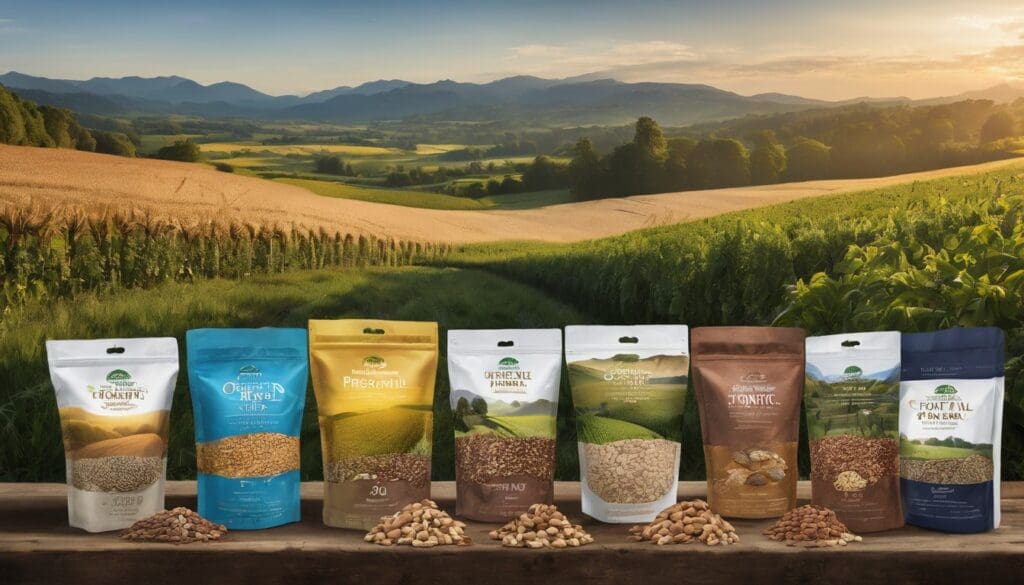Choosing the right cooking oil is not just about taste; it’s also about our planet’s health. With every drizzle and sizzle, the type of oil we use can leave a footprint on the environment.
This article will guide you through picking oils that are good for your heart and kind to Earth. Read on, your future salads and stir-fries may thank you!
What Makes a Cooking Oil Environmentally Friendly?
When choosing a cooking oil, consider sustainability factors like production methods and impact on the environment. The way an oil is produced and its overall impact on the environment are important considerations for making environmentally friendly choices.
Sustainability factors
Sustainability factors are at the heart of choosing ecofriendly cooking oils. Look for oils that require less water and fewer pesticides during growth, which puts a lighter touch on our planet’s resources.
Sustainable oils often come from plants like olives or rapeseed that thrive in their natural environments without draining local ecosystems.
Transport plays a big role too; locally grown cooking oils cut down on carbon emissions since they travel shorter distances to reach your kitchen. Opting for cold-pressed options not only preserves more nutrients but also uses less energy in production compared to other methods.
Check labels for certifications indicating ethical sourcing and organic practices, ensuring you support environmental responsibility with every purchase.
Production methods
To ensure the sustainability of cooking oils, it’s crucial to understand their production methods. Sustainable vegetable oils are often produced using eco-friendly practices such as organic farming, cold-pressing, and ethical sourcing.
These methods help minimise environmental impact and promote the preservation of natural resources. By choosing oils that have been produced using these sustainable methods, environmentally conscious individuals can support conservation efforts while also benefiting from healthier cooking options.
Cold-pressing and ethical sourcing contribute to the environmental responsibility of oil production. Organic farming ensures that harmful chemicals are not used in cultivation, promoting a more eco-friendly process.
Impact on the environment
When considering the impact on the environment, it’s important to choose cooking oils produced using sustainable methods and ethical sourcing. Opt for oils with minimal processing and packaging, reducing waste and pollution.
Look for organic options that support eco-friendly practices by choosing cold-pressed or expeller-pressed oils to minimise energy consumption during production.
To ensure a positive environmental impact, prioritise oils from responsible sources that promote conservation and biodiversity. Consider the carbon footprint of each oil, opting for those with lower greenhouse gas emissions in their production process.
Considerations for Choosing a Healthy Oil
When choosing a healthy oil, it’s important to consider the types of fats present, recommended intake, and proper storage and disposal methods. These factors can help you make an informed decision about which oils are best for your health and the environment.
Types of fats
Fats can be categorised into three main types – saturated, unsaturated, and trans fats. Saturated fats are found in animal products and some plant-based oils, while unsaturated fats come from sources like nuts, seeds, and fish.
Trans fats are mostly artificial and found in processed foods. Unsaturated fats are generally considered the healthiest option as they help reduce bad cholesterol levels in the body.
Choosing cooking oils that contain more unsaturated fats such as olive oil or avocado oil can contribute to a healthier diet. These oils can also have a lower environmental impact when sourced sustainably, making them a great choice for both personal health and environmental responsibility.
Recommended intake
To ensure a healthy intake of cooking oils, it’s crucial to consider the types of fats they contain. Opt for oils high in unsaturated fats, such as olive oil and avocado oil, while limiting saturated and trans fats found in coconut oil and palm oil.
Moderation is key; aim for about 2-3 tablespoons per day as part of a balanced diet, considering individual dietary needs and overall calorie intake.
When choosing sustainable and healthy cooking oils, prioritise those with eco-friendly production methods and minimal environmental impact. Look for organic or cold-pressed options that are responsibly sourced and packaged to support conservation efforts.
How to store and dispose of oils
To store and dispose of oils in an environmentally responsible manner, consider the following:
- Store oils in a cool, dark place to prevent oxidation and rancidity.
- Keep oils tightly sealed to avoid exposure to air and light, which can cause spoilage.
- Dispose of used cooking oils by recycling them at designated collection points or facilities.
- Avoid pouring oil down the drain as it can clog pipes and harm aquatic life.
- Consider reusing cooking oils for non – food purposes such as making homemade soaps or as fuel for oil lamps.
- Look for community programmes that accept used cooking oils for recycling into biofuels or other products.
- If unable to recycle, solidify small amounts of used oil by mixing with absorbent materials like coffee grounds or cat litter before disposing in the rubbish.
The Best and Worst Sustainable Cooking Oils
Discover which cooking oils are the most sustainable and environmentally friendly, as well as those that have a higher impact on the environment. Read on to learn more about making conscious choices in your cooking oil selection.
Avocado oil
Avocado oil is a sustainable option for cooking and baking. It is extracted from the flesh of avocados, making it an eco-friendly choice. The production process involves minimal environmental impact, and the oil’s high smoke point makes it suitable for various culinary uses.
Known for its health benefits, avocado oil contains heart-healthy monounsaturated fats and antioxidants, contributing to overall well-being. It also enhances the flavors of dishes without overpowering them, adding a subtle nutty taste that complements both sweet and savory recipes.
When choosing sustainable and healthy cooking oils, consider incorporating avocado oil into your culinary repertoire.
Olive oil
When choosing a sustainable and healthy cooking oil, consider olive oil as it is versatile and has numerous health benefits. Cold-pressed extra virgin olive oil is the most environmentally friendly option as it involves minimal processing and retains its natural antioxidants.
It also offers a high smoke point, making it suitable for various cooking methods while maintaining its nutritional properties. When sourcing olive oil, opt for organic or ethically produced options to support sustainable farming practices and ethical sourcing.
Moving on from discussing Olive Oil, let’s delve into the next section about Canola Oil – one of the best sustainable choices for cooking.
Canola oil
Canola oil is known for its high smoke point, making it suitable for various cooking methods like frying and baking. It is produced from the seeds of the canola plant through a process that maintains the nutritional value of the oil.
Organic cold or expeller pressed canola oil is considered to be more environmentally friendly due to its minimal processing and lack of chemical solvents. When choosing canola oil, look for sustainably sourced options in eco-friendly packaging to reduce environmental impact.
Canola oil is also low in saturated fats and high in healthy omega-3 fatty acids, making it a heart-healthy choice for cooking.
Canola oil’s versatility and health benefits make it an excellent option for environmentally conscious individuals looking to support conservation efforts while maintaining a healthy lifestyle.
Corn oil
Moving on from discussing coconut oil, let’s consider corn oil as another option for sustainable and healthy cooking. Corn oil is a popular choice due to its high smoke point and mild flavor, making it suitable for various cooking methods such as frying, sautéing, and baking.
It is rich in polyunsaturated fats and contains beneficial compounds like vitamin E and phytosterols that contribute to heart health. When sourced from organic or non-GMO corn, it can be a sustainable choice; however, it’s important to ensure responsible sourcing practices when selecting this oil.
Corn oil production poses some environmental challenges due to the intensive farming practices associated with corn cultivation. Nonetheless, choosing certified organic or sustainably sourced corn oil can help mitigate these concerns while enjoying its health benefits.
Sunflower oil
Sunflower oil is a versatile and sustainable cooking oil. It is rich in vitamin E and low in saturated fats, making it a healthy choice for everyday use. This oil is produced from sunflower seeds, which are widely available and can be sourced locally, reducing the environmental impact of transportation.
Sunflower oil also has a high smoke point, making it suitable for high-heat cooking methods such as frying or roasting. When considering sustainability and health, sunflower oil is an excellent option for both cooking and baking.
Moving on to “Environmentally Responsible Oils”..
Choosing the Most Sustainable and Healthy Cooking Oil
When choosing a cooking oil, consider factors such as smoke point, refinement, sourcing, packaging and flavor. Recommended options include unrefined British rapeseed oil, organic cold or expeller pressed canola oil, and organic olive oil.
Factors to consider (smoke point, refinement, sourcing, packaging, flavor)
When choosing a cooking oil, it’s essential to consider its smoke point, which determines the temperature at which the oil starts to break down and release harmful compounds. The refinement process also matters as it impacts the nutritional quality of the oil.
Additionally, sourcing and packaging play a crucial role in sustainability, while flavor is important for culinary purposes.
Understanding these factors will help you make an informed decision when selecting a sustainable and healthy cooking oil that aligns with your environmental values and dietary needs.
Conclusion
Consider the environmental impact and health benefits when choosing cooking oils. Look for sustainable options such as unrefined British rapeseed oil or organic cold-pressed canola oil.
Pay attention to smoke point, refinement, sourcing, packaging, and flavor to make an informed choice. Make a conscious effort to support conservation and environmental responsibility in your culinary choices.
Choose oils that are both environmentally friendly and beneficial for your well-being.





